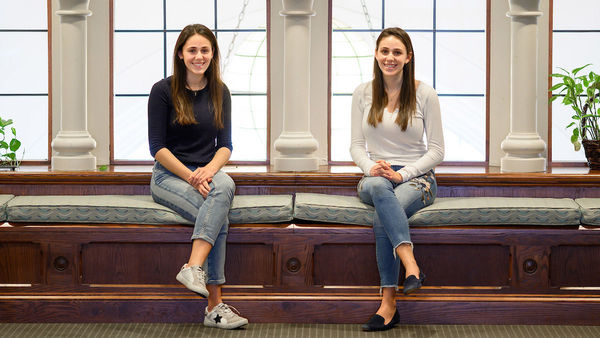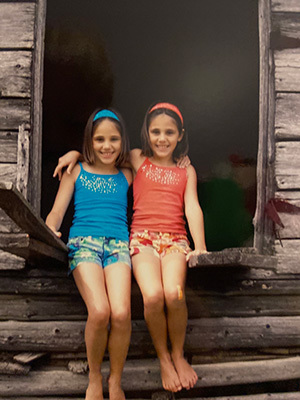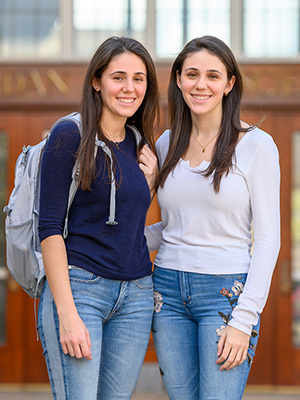
As the story goes, when identical twins Olivia and Sofia Perez arrived for the first day of preschool, they noticed something peculiar about the other kids.
“We were like, ‘There’s only one of them,’” Sofia, the “younger” of the two by about four minutes, said.
It raised the question: Was everyone not a twin?
“We never really thought about it,” Sofia said of being one of a pair. “We just thought it was normal.”
Soon, in addition to twin, the sisters, both senior biochemistry majors at the University of Notre Dame, will share another title: medical student.
The pair were recently accepted to the University of Miami Miller School of Medicine, the oldest medical school in Florida and among the top 40 in the U.S. for NIH funding. The school typically accepts fewer than 5 percent of applicants.
“We were so happy when we got accepted. It’s been our first choice for a while,” said Olivia. “We have a lot of family in Miami, so it will be nice to get back.”
And give back.
“I’ve always thought of doctors like superheroes,” Sofia said. “All it takes is hard work to learn all the stuff and then you can help people so much.”
The sisters are awaiting details of the financial aid package, but would join a short list of twins to enroll at the medical school, which is part of the second largest medical/research complex in the U.S.
The more “hands-on” of the two, Olivia hopes to become a surgeon. Sofia, less sure of her ability with a scalpel but fascinated with pharmacology, wants to be an anesthesiologist. They hope to someday serve on the same surgical team.
“We’ve always been known as a pair,” Sofia said.
It’s a short distance from their home in South Florida, but a long way from where they started — two of three siblings in a multicultural household about an hour north of Miami.
“This is farther than anyone in our family expected us to get,” Sofia said.
Together, apart

Born to a Cuban-American father and a Canadian-American mother, the sisters grew up in a “culturally rich” area of South Florida. They became interested in medicine early on, during a church-sponsored mission trip to Haiti with Hands Together, a Catholic nonprofit that operates a health clinic in the country.
And while they excelled in and out of the classroom, their expectations for college were modest, shaped by assumptions about the qualities and characteristics that schools like Notre Dame most value in prospective students.
“We applied to Notre Dame thinking we definitely were not going to get in,” Sofia said. “But our family is very Catholic, so our parents were like, ‘Yeah, go to a Catholic school.’”
When they did get in, and then finally arrived on campus in the fall of 2017, they were relieved to discover a welcoming community of students, faculty and staff from a variety of social and economic backgrounds.
“Notre Dame has been great to us in terms of financial aid and being supportive of our background and helping us out,” Sofia said. “We came here from a high school that did not challenge us academically at all, so it was not easy to adjust. But everyone has been very helpful and our friends have been great.”
One big adjustment: living apart.
Like many schools, Notre Dame generates housing assignments randomly for incoming students to build diversity and expose students to people from different social and economic backgrounds. As a result, the sisters ended up in separate residence halls.
“That was kind of our first experience of, ‘Well, she’s not right there next to me,’” said Olivia. “And honestly, I think it really helped us. We’re still really close and we have every class together, but we have different friend groups.”
Through Building Bridges, a mentoring program within Multicultural Student Programs and Services, the sisters were assigned faculty mentors to assist with the transition from high school to college, chart an academic course and explore opportunities for undergraduate scholarly engagement, including research.
In this way, they began working with Marya Lieberman, professor of chemistry and biochemistry and principal investigator with the Paper Analytical Device Project, to develop paper analytical devices to detect low-quality medicines outside of the lab — work that continues to this day, with implications for the treatment of a number of pesky diseases around the world.
Specifically, the sisters iterated a process for analyzing a class of antimalarial drugs, counterfeit versions of which proliferate in East Asia and Africa, complicating efforts to eradicate the mosquito-borne disease in those parts of the world.
The sisters met Lieberman as students in her scientific literature and presentation seminar, which has students critically consume and present real and fictitious examples of scientific literature.
“It’s been really fun,” Lieberman said. “Some twins just want to get apart, but they really enjoy each other and enjoy working together.”
She described the sisters as “quite organized and sort of self-organized,” qualities she said would serve them well in medical school and beyond.
“For some students, you feel like you need to tell them, ‘This is what you should be doing,’” she said. “But Olivia and Sofia are really good at setting a plan for each semester. They have weekly goals and they evaluate those goals and they’re thoughtful about it.”
At the same time, she said, “When they’re in the lab they seem really happy with what they’re doing in terms of physical tasks. A lot of the things they do could be frustrating or boring, but they get around it.”
As incoming students, Sofia said, she and her sister “didn’t even know what undergraduate research was.”
She credits Building Bridges with introducing them to the concept.
“I didn’t think it was a thing that undergraduates did,” Olivia said. “But it’s been foundational in teaching us how to academically schedule ourselves and figure out how to improve on processes. It went hand in hand with studying, but it also gave us something else to think about in addition to textbook learning.”
‘Am I seeing double?’

With support and encouragement from Tatiana Botero, teaching professor of Spanish, the sisters also joined the Spanish Club, rising to officers in the club, and participated in the Center for Social Concerns’ Summer Services Learning Program (SSLP), which offers students the opportunity to serve with nonprofits related to health care, homelessness, immigration, education and other social issues during the summer.
As part of SSLP, Olivia volunteered with Sparta Health Center in Sparta, Michigan, and Sofia with CrossOver Healthcare Ministry in Richmond, Virginia, as rising juniors. Both clinics serve sizable Hispanic populations, including a large number of migrant workers in the case of Sparta.
“I am so proud of them,” said Botero, who met the sisters as students in her culture, conversation and writing class and grew close to them as both a friend and mentor during long walks and coffees after class. “I’ve loved being part of their journey. It’s really rewarding to see when students are successful and when, after they take your class, they still have that engagement with you.”
She credits the sisters with taking the initiative in that regard, recalling how she initially fretted when they showed up for the first day of class and sat right next to each other.
“I thought, ‘Oh my God, am I seeing double?’” she said. “So it was very sweet of them when they came to me after class and introduced themselves.”
They even promised to sit in the same order — Olivia to the right of Sofia — the whole semester to avoid confusion.
Botero said she is especially proud of the sisters’ commitment to the practice of medicine in both English and Spanish, recognizing the growing need for physicians who can effectively communicate with patients and colleagues in an increasingly multicultural world.
“One thing that’s been very clear from the start is that they both wanted to go to medical school but they both wanted to be bilingual,” Botero said. “They don’t want to be doctors that have a translation service. And they not only want to know the language, they want to know the culture.”
Which is indicative of their competence and compassion overall, Botero said.
“First of all, academically they’re just excellent, both in their own way,” she said. “They’re both hard working and meticulous about their work. They want to turn in their best work always.
“On the other hand, they also have that human aspect, that caring aspect. And I think that will make them the kinds of doctors people fall in love with. Because they know what they’re doing but they’re also kind.”
Set up for success
Lieberman credits Building Bridges with helping steer the sisters toward success early on.
“It really shows how important programs like Building Bridges are,” she said. “Because a lot of students come to Notre Dame and they are savvy and prepared, and for those students who are not as prepared — and not just academically but knowing how things work in higher education — that’s a barrier for them.”
“The success of Building Bridges relies on two factors: 1) students who take the initiative to explore all of the opportunities that Notre Dame has to offer, and 2) faculty who are dedicated to supporting the developmental growth of our students,” said Arnel Bulaoro, interim director of Multicultural Student Programs and Services. “Olivia and Sofia have accomplished so much as undergraduates because of who they are and what they want to become. Along the way they met some incredible faculty and staff members at Notre Dame who opened doors. That is the Building Bridges narrative.”
The sisters, for their part, credit their parents with teaching them the value of hard work and discipline from an early age. Particularly their father, who liked to remind them about how, as an immigrant with a limited grasp of English, he would sit down to study as a child with two books open: one for schoolwork and one for language.
He expected the same effort from his children. In all aspects of life.
“I remember nights where I was ready to go to bed and he would say, ‘No, you have to stay up and study,’” Sofia recalled. “It was kind of stressful, but in the end we learned a lot about dedication from him.”
That extends to their work outside of the classroom, with nonprofit organizations working to improve and expand access to health care among poor and vulnerable populations worldwide.
Olivia, for her part, hopes to return to Haiti someday, but as a doctor with Hands Together instead of a volunteer.
“I want to go back to that organization,” she said. “I want to go back and be the physician I once looked up to.”
Originally published by at news.nd.edu on March 26, 2021.